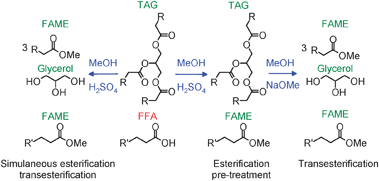Karen Wilson and Adam Lee from Cardiff University discuss the recent development of heterogeneous catalysts for synthesising biodiesel.
Biodiesel is synthesised from triglycerides and free fatty acids that have been extracted from plant oil seeds (such as rapeseed, palm, soybean), animal fats, and algae. Transesterification and esterification of triglycerides and free fatty acids, respectively, using simple acid or base catalysis produces the resultant biodiesel alkyl ester.

Soluble base or acid catalyts can create problems such as reactor corrosion and you also have the added task of having to remove the catalyst from the product which can be somewhat energy intensive (thereby lessening the green-ness of the fuel). It would seem that heterogeneous catalysis is the way forward, providing a more efficient process and also enabling greater purity of the glycerol by-product .
As Wilson and Lee set out in their Perspective article, several considerations should be made when designing solid acid and base catalysts: acid or base strength, tuneable surface polarity, and pore architecture.
To find out the effects these catalytic properties have, download the article now for free…
Rational design of heterogeneous catalysts for biodiesel synthesis
Karen Wilson and Adam F. Lee










